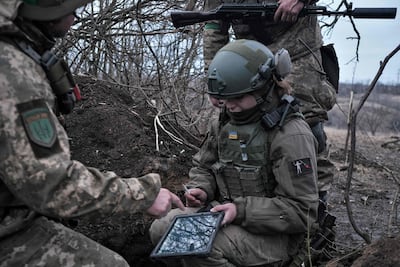Russian artillery ammunition shortages have probably worsened to the extent that “punitive shell-rationing” is taking place in many areas of Ukraine's front line, according to British military intelligence.
The Ministry of Defence said this explains is why Russian forces have failed to advance recently, despite focusing their efforts in the beleaguered town of Bakhmut.
The update comes as both sides, particularly Russia, continue to suffer high casualties in the ruined mining town, with the months-long fight for it becoming Europe's bloodiest infantry battle since the Second World War.
“It is very tough in the east — very painful,” Ukrainian President Volodymyr Zelenskyy said in a Monday video address that he has held nightly since Russia launched its invasion more than a year ago.
“We have to destroy the enemy's military power. And we shall destroy it,” he said.
The ministry said: “In recent weeks, Russian artillery ammunition shortages have likely worsened to the extent that extremely punitive shell-rationing is in force on many parts of the front.
“This has almost certainly been a key reason why no Russian formation has recently been able to generate operationally significant offensive action.
“Russia has almost certainly already resorted to issuing old munitions stock which were previously categorised as unfit for use.”
Separately, in what would be the first international war crimes cases arising from the invasion, the International Criminal Court (ICC) is expected to seek the arrest of Russian officials for forcibly deporting children from Ukraine and targeting civilian infrastructure, a source told Reuters.
Russia would be certain to reject arrest warrants against its officials, but an international war crimes prosecution could deepen its diplomatic isolation over a campaign that has killed thousands of civilians and driven millions from their homes.
Speaking on Tuesday, Kremlin spokesman Dmitry Peskov said Russia does not recognise the jurisdiction of the ICC after being asked about the reports the ICC was expected to seek its first arrest warrants against Russian individuals in relation to the conflict in Ukraine shortly.
"We do not recognise this court, we do not recognise its jurisdiction," Mr Peskov told Tass, the Russian news agency.
Ukraine and Russia conflict latest - in pictures
The prosecutor of the ICC is expected to ask a pre-trial judge to approve issuing warrants against several Russians for the abduction of children from Ukraine to Russia and the targeting of civilian infrastructure in Ukraine, a source with knowledge of the matter told Reuters on Monday.
Russia, however, appeared on the cusp of one long-sought diplomatic breakthrough with sources telling that Chinese President Xi Jinping could visit Russia as soon as next week.
The Chinese Foreign Ministry did not respond to requests for comment. The Kremlin said it had nothing to announce yet.
Bakhmut
On the battlefront, Ukrainian soldiers said on Monday they were repelling attacks near Kreminna, north of Bakhmut.
In a forest, some 8km from the front, cannons boomed and explosions rumbled constantly in the distance.
Agency reporters on the ground saw a soldier being brought from the front with a wounded leg. He was stabilised in a van with a splint and painkillers before being taken to a medical centre.
“Two or three weeks ago the fighting was at its peak but it has calmed down a bit,” said Mykhailo Anest, a 35-year-old medic.
“There is a lot of artillery and mortar fire.”

Trench warfare, described by both sides as a meat grinder, has claimed a huge toll in Bakhmut, in Donetsk, with both sides reporting hundreds of enemy troops killed.
Russia launched five missile attacks, 35 air strikes and 76 heavy rocket salvo systems during the past day, including on civilian infrastructure in the Sumy and Donetsk regions, Ukraine's military said on Wednesday.
Ukrainian forces repelled attacks on seven settlements in the Bakhmut front, it said.
Russia says taking Bakhmut would open a path to capture all of Donetsk, a central war aim.
Ukraine, which has decided to defend Bakhmut rather than withdraw, says wearing out Russia's military now will help its counter-offensive later.
But not every military analyst is convinced that defending Bakhmut is the best strategy for Ukraine.
Ukraine was suffering losses among reserves it intended to use for a later push against Russian forces, Ukrainian military analyst Oleh Zhdanov said in an interview.
“We could lose here everything we wanted to use for those counter-offensives.”













